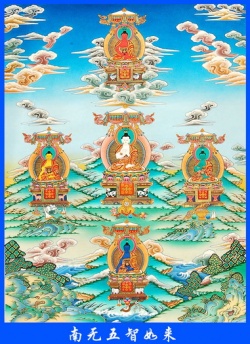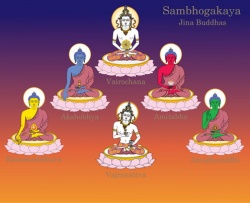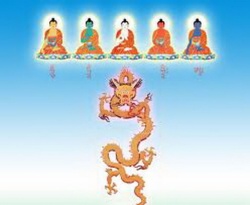Difference between revisions of "Symbolism of the five Dhyani Buddhas"
Jump to navigation
Jump to search
Physical symbolism of the five Dhyani Buddhas:
Names and relation to other Buddhas & Bodhisattvas:
Imagery symbolism of the five Dhyani Buddhas:
More symbolism of the five Dhyani Buddhas:
m (Text replace - "example" to "example") |
m (Text replacement - "Bestowing" to "Bestowing") |
||
| Line 69: | Line 69: | ||
| [[Akshobhya]] ||style="background-color:#0099ff;height:25px"| [[Blue]] || East || Bhumisparsa<br/>Earth-touching|| [[File:Akshobhya-1table.gif]] | | [[Akshobhya]] ||style="background-color:#0099ff;height:25px"| [[Blue]] || East || Bhumisparsa<br/>Earth-touching|| [[File:Akshobhya-1table.gif]] | ||
|- | |- | ||
| − | | [[Ratnasambhava]] ||style="background-color:#ffff00;height:25px"| Yellow || South || Varada<br/> | + | | [[Ratnasambhava]] ||style="background-color:#ffff00;height:25px"| Yellow || South || Varada<br/>Bestowing, giving|| [[File:Ratnasambhava1table.gif]] |
|- | |- | ||
| [[Amitabha]] ||style="background-color:#ff0000;height:25px"| Red || West || [[Dhyana]]<br/>Meditation|| [[File:Amitabha1table.gif]] | | [[Amitabha]] ||style="background-color:#ff0000;height:25px"| Red || West || [[Dhyana]]<br/>Meditation|| [[File:Amitabha1table.gif]] | ||
Revision as of 10:59, 12 September 2013
The five Dhyani Buddhas are mentioned in most of the tantric systems and represent various physical and mental aspects. Here are given only some of the most common explanations and representations of these so-called 'Heads of the five Buddha-families'.
It should be noted though that many different forms of each deity exist, and different tantras can have slightly different explanations (for example, in the Kalachakra tantra, six Dhyani-Buddhas are mentioned, and most have different colors and shapes).
The five Dhyani-Buddhas are also often found on the crown on the head of tantric Buddhas, like this:
| Deity | Delusion | Enlightened Mind |
|---|---|---|
| Vairochana | ignorance, delusion | All-encompassing Dharmadatu Wisdom |
| Akshobhya | anger, hatred | Mirror-like Wisdom |
| Ratnasambhava | pride, miserliness | Wisdom of Equality |
| Amitabha | desire, lust | Discriminating Wisdom |
| Amogasiddhi | jealousy, fear | All-accomplishing Wisdom |
| Deity | Element | Sense | Medical/physical | Organ |
|---|---|---|---|---|
| Vairochana | space | sight | energy channels | heart |
| Akshobhya | water | sound | blood flow | kidneys |
| Ratnasambhava | earth | smell | flesh | spleen |
| Amitabha | fire | taste | body heat | liver |
| Amogasiddhi | air | touch | inner winds | lungs |
| Deity (Sanskrit) | English name | Consort | Bodhisattva | Wheel-turning Buddhas |
|---|---|---|---|---|
| Vairochana | Illuminating | White Tara (Vajradhatvisvari) |
Samantabhadra | Krakucchanda |
| Akshobhya | Unshakable | Locana | Vajrapani | Kanakamuni |
| Ratnasambhava | Jewel-born | Mamaki | Ratnapani | Kashyapa |
| Amitabha | Infinite Light | Pandara | Avalokiteshvara | Shakyamuni |
| Amogasiddhi | Conqueror | Green Tara | Vishvapani | Maitreya |
| Deity | Color | Direction | Gesture (mudra) | |
|---|---|---|---|---|
| Vairochana | White | Center | Dharmachakra Turning the Dharma-wheel (teaching) |
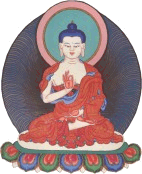
|
| Akshobhya | Blue | East | Bhumisparsa Earth-touching |
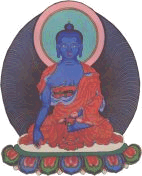
|
| Ratnasambhava | Yellow | South | Varada Bestowing, giving |
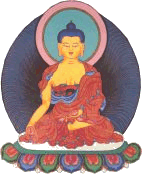
|
| Amitabha | Red | West | Dhyana Meditation |
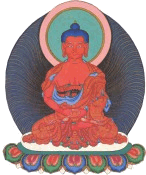
|
| Amogasiddhi | Green | North | Abhaya Fearlessness |
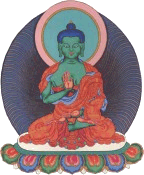
|
| Deity | Family symbol and family |
Syllable | Vehicle | Aggregate |
|---|---|---|---|---|
| Vairochana | Wheel Tathagata |
OM | dragon | form (Skt. rupa) |
| Akshobhya | Vajra Vajra |
HUM | elephant | consciousness (Skt. vijnana) |
| Ratnasambhava | Jewel Ratna |
TRAM | horse or lion | sensation (Skt. vendana) |
| Amitabha | Lotus Padma |
HRIH | peacock | perception (Skt. sanjna) |
| Amogasiddhi | Double Vajra Karma |
AH | Garuda | impulses (Skt. Samskara) |
Source
Article from A View on Buddhism-Symbolism of the five Dhyani Buddhas
